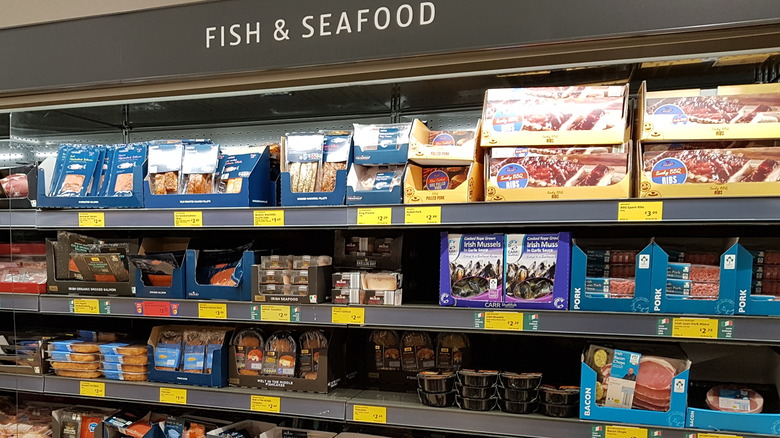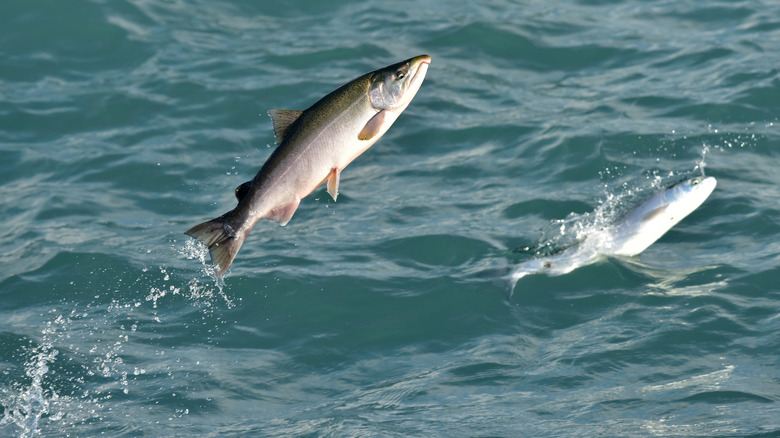The Aldi Seafood Scandal You've Forgotten About
There are plenty of fish in the supermarket sea, yet Aldi stands out for reasons both good and bad. Once a German corner store called Albrecht Discount during the early 20th century, Aldi has since come a long way, as documented by Insider. Founded by Anna Albrecht and split in two by her sons Karl and Theo, the company eventually went international. In the 1970s, Aldi arrived in the United States (and bought Trader Joe's), then gradually spread across the country over the following decades.
A variety of factors contribute to Aldi's success. The first is in its original name; Aldi prices are often at a discount relative to the rest of the industry, per Insider. It keeps costs low by limiting hours, making locations small, stocking private label generic brands, and using simple store designs, then passing on some of those savings to its customers. Aldi even charges shoppers a quarter to rent a cart, which is cost-effective in an unexpected way. The chain also carries fresh, organic, vegan, and vegetarian products in order to attract health-minded consumers. This helps make it both affordable and appealing.
Aldi has done especially well in spite of recent inflation and managed to keep its prices low, according to CNN Business. As of 2022, the chain had over 2,000 stores in the U.S. and shoppers have been flocking to those to save money more than usual. In some ways, Aldi can sometimes seem too good to be true.
Aldi's seafood
Like many other grocery chains, seafood is among the many products offered at Aldi. The grocer claims its seafood is responsibly sourced with reduced impacts on the oceanic ecosystem at large. Its practices are also meant to protect workers and treat them fairly. That's why Aldi marks its fish with the words: "Simple. Sustainable. Seafood." In order to verify this, Aldi says its products are certified by trusted third parties in some cases and strive to meet global standards or attain certification in others. An organization known as the Sustainable Fisheries Partnership even advises Aldi on these matters.
In theory, that's great! Sustainable seafood is beneficial to people, the economy, and our planet, per Seafood Watch. Relying on these kinds of fish helps protect vulnerable aquatic species and habitats, since harmful impacts such as overfishing are minimized. Additionally, this sector of the seafood economy usually adheres to international laws, which also increases the likelihood that safe labor conditions are provided to workers. Consumers can help conscientious companies afford the costs associated with sustainable businesses simply by purchasing their end product.
In practice, though, is Aldi's sustainable seafood all it's cracked up to be?
There's a class-action lawsuit
Some say "no." Per ClassAction.org, a lawsuit filed in 2021 alleges Aldi's fresh Atlantic salmon is not sustainably sourced, despite what the company claims. In fact, this class action accuses Aldi of using industrial practices that harm the environment while mistreating its fish in ways that are inhumane and shocking. If truly misleading, this form of marketing could prove to be unlawful.
Specifically, Aldi is said to have sourced the salmon from Chile, where they are not native and where net pen aquaculture is used (via ClassAction.org). This high-risk form of farming crowds fish inside cages, creating a stressful environment for the animals, which even spurs the salmon to hurt one another. That close proximity also facilitates the spread of chemicals, diseases, parasites, and waste. Supposedly, tests have even found a toxin called ethoxyquin, used as a fish-feed preservative, within Aldi's salmon. Furthermore, by using wild-caught fish as feed, Aldi might have contributed to the overfishing of marine populations. If true, it's certainly not a good look for Aldi's simple "sustainable" seafood.
So, what's the verdict? Unfortunately, we don't know yet. Consumers continued to shop at Aldi throughout 2022, seemingly forgetting about these disturbing allegations. Meanwhile, the most recent news about the case seems to have come in May of '22, when a court rejected Aldi, Inc.'s motion to dismiss the class-action lawsuit, according to PR Newswire. Sadly, the public may have to wait a while to see what the law decides.


